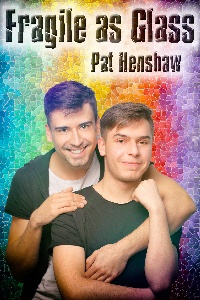A scrying stone says after his gift is destroyed, a famous songwriter will fall in love. Will the stone’s prediction come true?
Glass artist Ashton Snell is delighted when superstar singer/songwriter Hunter Davidson walks into his shop looking for a gift for a friend. On a whim Ashton looks through a scrying glass to see what’s in store for Hunter in the future. The stone shows a vision of the glass unicorn gift shattering and Hunter falling in love. Should Ashton tell Hunter what he’s seen?
Before he can decide, Hunter asks him to lunch. Ashton agrees although he’s surprised someone as celebrated as Hunter would want to be seen with him. Despite living with it since birth, Ashton is still self-conscious about his limp. Hunter, however, doesn’t seem to notice it.
Could their lunch be the beginning of a lasting friendship? Or will their attraction turn into something more?

I handed him the bag. He put his hand over mine for a few seconds, long enough to make me shiver and wish I was someone else. Someone who could attract a man like him.
“When do you take off for lunch?” he asked abruptly.
The question was as surreal as the entire encounter had been. I shook myself.
Since it was a few minutes past twelve, I had planned to close the shop and eat after he left. The sign at the door said the shop was closed from noon to one, which was mostly true. I was a little nonplussed about his question and what I should answer.
“No, wait. That’s not what I wanted to ask.” He ran a hand through his hair. “Would you go out to lunch with me? Now? Today?”
What the heck?
He looked pleased with himself, which was funny because he was a well-known celebrity, one of those performers who people recognized even if they couldn’t remember his name. I was flattered. And flustered. No, a thousand times no. But wait. Why not? I couldn’t come up with an answer. This was a once in a lifetime chance.
“Uh, yeah, sure.” I tried to keep my internalizing hidden. Between my clamoring thoughts and pounding heart, I wasn't sure I could. “I just need to lock up since I’m the only one here until later.”
“Great.” He beamed like I’d done something to make him extraordinarily happy.
As I turned off lights and made sure the shop was secured, he strolled around the displays again. The first time, he’d seemed intent and focused on finding the perfect gift. This time, his fingers tapped lightly against the sales bag as if he were drumming to a song only he heard.
Without his stage makeup, he looked like an ordinary customer, which startled me. Weren’t superstars a breed apart? His status as an icon was slipping. I was enchanted by the change.
His onstage signature curly, floppy, brilliant red hair was now cropped short and looked almost mouse brown in the low light of the shop. Without eyeliner, his face was ordinary, unremarkable. His jeans, T-shirt, and blazer, all in shades of blue, were the uniform of men over thirty. No wonder he hadn’t been followed and had no entourage. He looked like a lot of the guys walking around the city.
When I finished closing up and moved to the front door, he hurried over to me.
“Where to?” he asked. “I’m not familiar with this part of the city. Let’s go somewhere not too public, if it’s all right with you. I’d like to talk. Trade ideas.”
Trade ideas? What did I know about music or songwriting? This promised to be a really short conversation.
“Sure. No problem,” I said as I locked up and pocketed the keys. “Arnold’s is a couple blocks away. I think you’ll like it.”
Arnold was the Americanized version of the Greek chef’s name. He and my grandfather were about the same age and best friends. My father and his son, another Arnold, were their tagalongs.
My mother was appalled by the elder Arnold because he constantly told her she was a disgrace. Why were the men in her family so skinny? Did she not feed them? She would stomp away while Arnold laughed.
“Your mother takes herself too seriously,” he’d tell me. “She should dance and sing more.”
Which was the other part of my mother’s disgust with Arnold. He, my grandfather, and my father would sit on the front porch of our house at night after he closed his tiny restaurant. There they’d drink ouzo, belt out folksongs, and challenge each other to perform fancy dance steps.
Mother threatened to call the police to quiet them with a warning, but she never did. Nor did the neighbors who could often be found watching and egging the men on.
Because he made me nervous, I told most of this to Hunter as we walked to Arnold’s. The story had no real point. As we neared the plain storefront with the plate glass window, my words slowed, then stopped. I was out of breath, trying to keep in step with him like a normal person.
I gestured to the elaborately written Arnold’s with a stylized depiction of applause -- clapping hands and arms waving -- under it.
“We’re here.” I was nearly panting.

